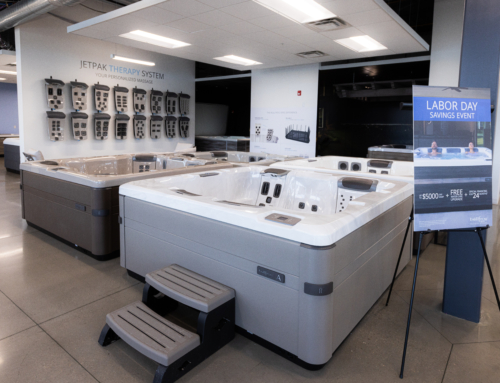Established hot tub retailers, retailers who have experienced a fair amount of success, have much to teach newcomers to the industry. It may come as a surprise then to learn that experienced business owners can learn a lot from the startups, too.
Remember when you first started your business? Remember the excitement of opening your store, of establishing a customer base, of finding new and better ways to succeed? Do you wonder why the new store in the next town is doing more business than your store? It might be because you’ve forgotten what it was like in the beginning. When your business hits a plateau or drops off, one way to get it back on is to start thinking like a startup again.
So, what do startups have that you may have lost? According to America’s Swimming Pool Company founder Stewart Vernon, “When I started my business as a senior in college, the most powerful tool I had was motivation and an entrepreneurial spirit.” If your business is stagnant or struggling, it may time to rekindle that spirit. Read on to find out how.
Back to Basics
When was the last time you really evaluated your business and your motivation for starting it? The US Small Business Association suggests that entrepreneurs ask themselves some specific questions as they begin to plan their businesses.
- Why am I starting a business?
- Who is my ideal customer?
- What differentiates my business idea and the products or services I will provide from others in the market?
- Who is my competition?
- How will I manage my business?
- How will I advertise my business?
As an established retailer, you should ask these questions of your own business. Why did your start this business? How do you manage and advertise it? What differentiates your business from your competition? Is your competition the same today as it was when you started out? Is your ideal customer different now than it was then?
Go back to the beginning to discover what you were then and who you are now; then decide what you want to be in the future and work toward that goal. - Scott Ewings
Chances are the way you answer the questions today will differ from how you would have answered them when you were starting out. Scott Ewings of Big Radical believes that “every business should behave as if it still a startup. One key to rekindling that entrepreneurial spark is continued reinvention. Go back to the beginning to discover what you were then and who you are now; then decide what you want to be in the future and work toward that goal.”
Components of a Startup Mindset
According to an article in Forbes magazine, a startup mindset for most entrepreneurs consists of five core philosophies.
- Curiosity: People just starting up in business want to know “why,” “why not,” and “what if.” They want to find a better way to do things and gain new insight.
- Possibility: Entrepreneurs take time to imagine what their business could be instead of just trying to maintain what it is. They are always looking toward the future and fresh possibilities.
- Nonconformity: Because startups often have very little to lose, they are willing to buck the status quo and go their own way. They succeed by pushing the boundaries.
- Fearlessness: Successful entrepreneurs have an innate ability to commit instead of cower. They will act in spite of any reservations they may have.
- Speed: There is a sense of urgency in startups that isn’t found as often in established businesses. While startups sprint to their goals with innovation and imagination, established businesses are tied up in a marathon of training manuals and policy planning.
You started this business, you opened your store and built it into what it is (or isn’t) today. Think of the future possibilities for your business, and don’t be afraid to do something different—to go against the status quo. Satisfy your curiosity, think outside the box and take a chance every now and then!
Engage Your Team
Successful entrepreneurs don’t go it alone; they function as a team alongside executives, managers, and employees. How do these business people cultivate a startup mindset that leads to successful teamwork? They create a mission-driven culture that does these things:
- Encourages Questions
- Embraces Change
- Allows for Mistakes
- Remains Focused
Startups question everything and everyone on the team and off it. Encourage your team to share their ideas and visions and ask them “how can we” and “why don’t we.” Be open to them asking you those same questions. Facilitate real discussions with people at every level, bring in members of other teams, and utilize outside sources and experts.
While established retailers often resist change (think online vs. brick and mortar), startups embrace these changes. They are flexible and innovative in all areas of their business and they immediately shy away from the “old ways” in favor of new advancements in technology and workplace structure.
While established retailers often resist change (think online vs. brick and mortar), startups embrace these changes.
When you started your business, you realized there would be mistakes along the way and, hopefully, you approached those mistakes as learning opportunities. Some mistakes can be more costly than others, but you have to make room for them because they are going to happen. Startups know this, and they communicate it to their teams. They have the mindset of Thomas Jefferson when he said, “I have not failed. I’ve just found 10,000 ways that won’t work.” Provide your people the opportunity to fail safely.
Finally, because they are fresh and new and exciting, startups are focused on their purpose. They never forget why they are doing what they do, and neither should you. Recognize the successes, the achievements, and the efforts of everyone on the team. Remind everyone, and remind them often, of your goals and the difference you want to make.
Now What?
Remember that every successful business began as a small business and grew. When you were a startup, one of the first things you did was develop a business plan. To begin to think like a startup again, start there. Review your business plan using the basic SBA outline to see if you’re still on track with your original goal and to give your business new direction. Don’t be afraid to change your business model to get a better market share.
As an established hot tub retailer, you have to remember that size doesn’t matter. What really matters is your business outlook and culture. If you want to achieve different, better business results, you have to let go of the mindset that says “let’s do things the way we’ve always done them” (which, by the way is the definition of insanity: doing the same thing the same way over and over again and expecting different results). Instead, cultivate an attitude of risk-taking and exploration—in short, start thinking like a startup!









Thank you for all your insight and motivation Lisa!